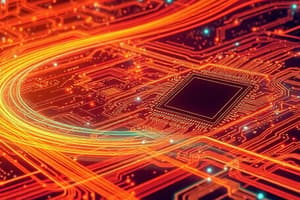Podcast
Questions and Answers
What is an FPGA and how does it differ from other integrated circuits?
What is an FPGA and how does it differ from other integrated circuits?
An FPGA is a type of integrated circuit that can be programmed or reprogrammed after manufacturing, consisting of an array of programmable logic blocks and interconnects. It differs from other integrated circuits in its reprogrammable nature and flexibility.
In what industries are FPGAs commonly used and why?
In what industries are FPGAs commonly used and why?
FPGAs are commonly used in telecommunications, automotive, aerospace, and industrial sectors due to their flexibility, speed, and parallel processing capabilities.
How is FPGA configuration generally specified, and what was used previously for this purpose?
How is FPGA configuration generally specified, and what was used previously for this purpose?
FPGA configuration is generally specified using a hardware description language (HDL), similar to that used for an application-specific integrated circuit (ASIC). Circuit diagrams were previously used to specify the configuration.
What types of logic functions can the logic blocks of an FPGA be configured to perform?
What types of logic functions can the logic blocks of an FPGA be configured to perform?
What role do FPGAs have in embedded system development, and what capabilities make them valuable for this purpose?
What role do FPGAs have in embedded system development, and what capabilities make them valuable for this purpose?
Flashcards
What is an FPGA?
What is an FPGA?
An integrated circuit that can be programmed after manufacturing, consisting of programmable logic blocks and interconnects, offering reprogrammability and flexibility.
Common FPGA industries
Common FPGA industries
Telecommunications, automotive, aerospace, and industrial sectors use FPGAs for their flexibility, speed, and parallel processing.
Specifying FPGA configuration
Specifying FPGA configuration
FPGA configuration is specified using a hardware description language (HDL), similar to that used for an ASIC. Circuit diagrams were previously used.
FPGA Logic Block Functions
FPGA Logic Block Functions
Signup and view all the flashcards
FPGA role in embedded systems
FPGA role in embedded systems
Signup and view all the flashcards
Study Notes
What is an FPGA?
- A Field-Programmable Gate Array (FPGA) is a type of integrated circuit that can be programmed and reprogrammed after manufacturing.
- FPGAs differ from other integrated circuits in that they can be reconfigured to perform different tasks, making them highly versatile and adaptable.
Industries where FPGAs are commonly used
- Aerospace and Defense: FPGAs are used in military and space applications due to their ability to be reconfigured in the field, reducing the need for new hardware.
- Automotive: FPGAs are used in advanced driver-assistance systems (ADAS) and autonomous vehicles due to their high performance and flexibility.
- Communications: FPGAs are used in telecommunications equipment, such as routers and switches, to accelerate data processing and transmission.
- Data Centers: FPGAs are used in cloud computing and data centers to accelerate tasks such as machine learning and data analytics.
FPGA Configuration
- FPGA configuration is generally specified using a Hardware Description Language (HDL) such as VHDL or Verilog.
- Previously, FPGA configuration was done using schematic capture or proprietary design tools.
Logic Functions of FPGA Logic Blocks
- The logic blocks of an FPGA can be configured to perform a wide range of logic functions, including:
- Combinational logic functions (e.g. AND, OR, NOT)
- Sequential logic functions (e.g. counters, registers)
- Arithmetic logic functions (e.g. adders, multipliers)
- Memory functions (e.g. RAM, ROM)
Role of FPGAs in Embedded System Development
- FPGAs play a crucial role in embedded system development due to their ability to:
- Offer high performance and low power consumption
- Be reconfigured and reprogrammed in the field
- Integrate multiple functions and interfaces into a single chip
- Provide a high degree of customization and flexibility
- Enable rapid prototyping and development
Studying That Suits You
Use AI to generate personalized quizzes and flashcards to suit your learning preferences.




